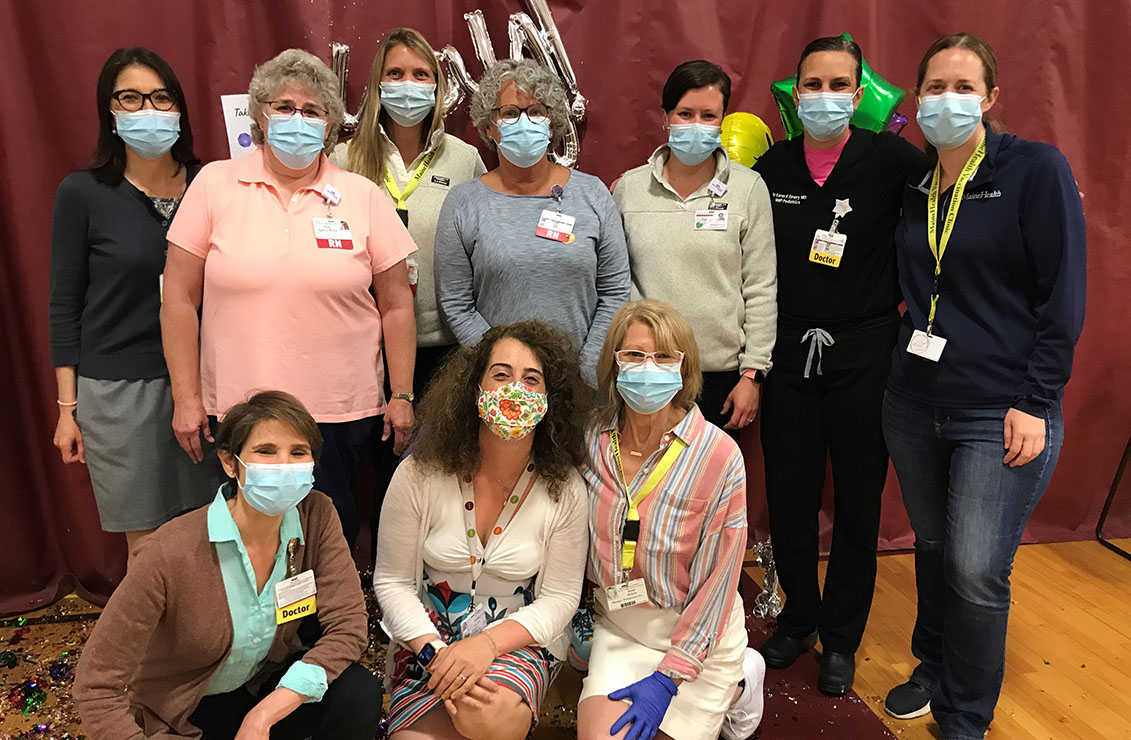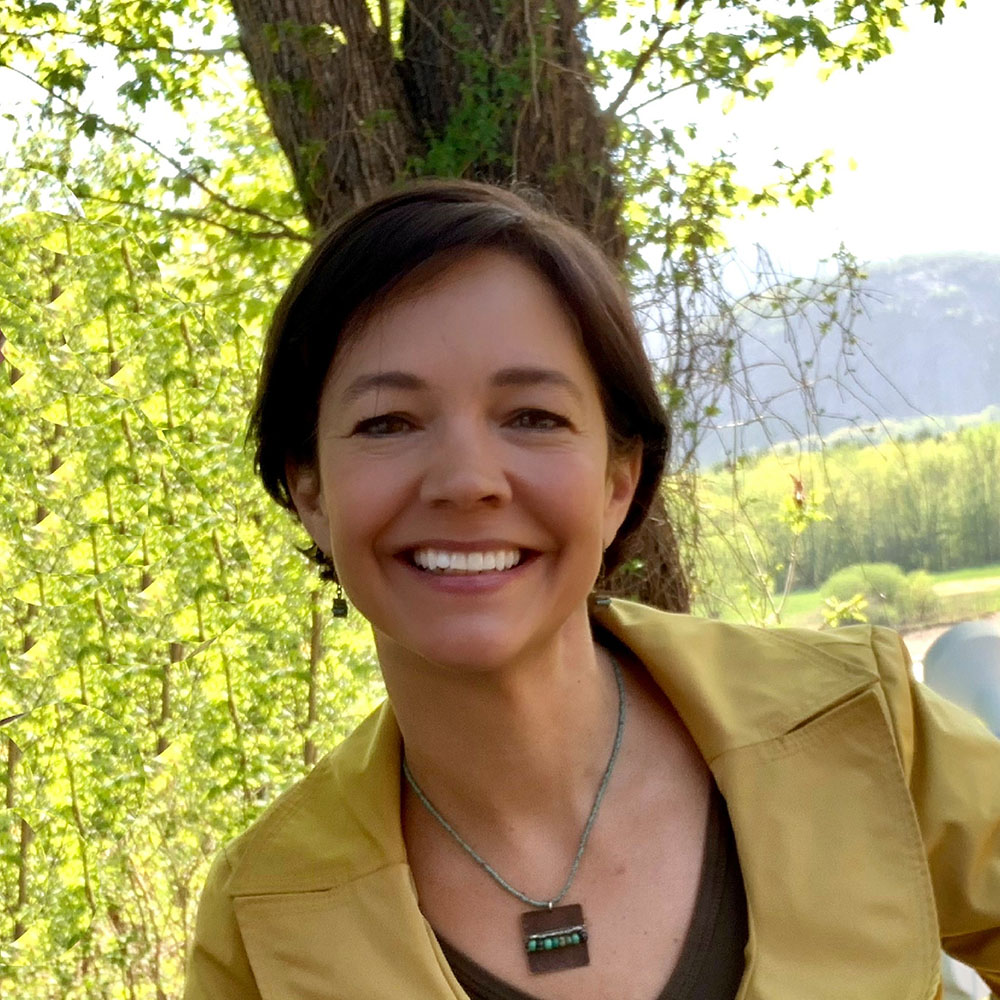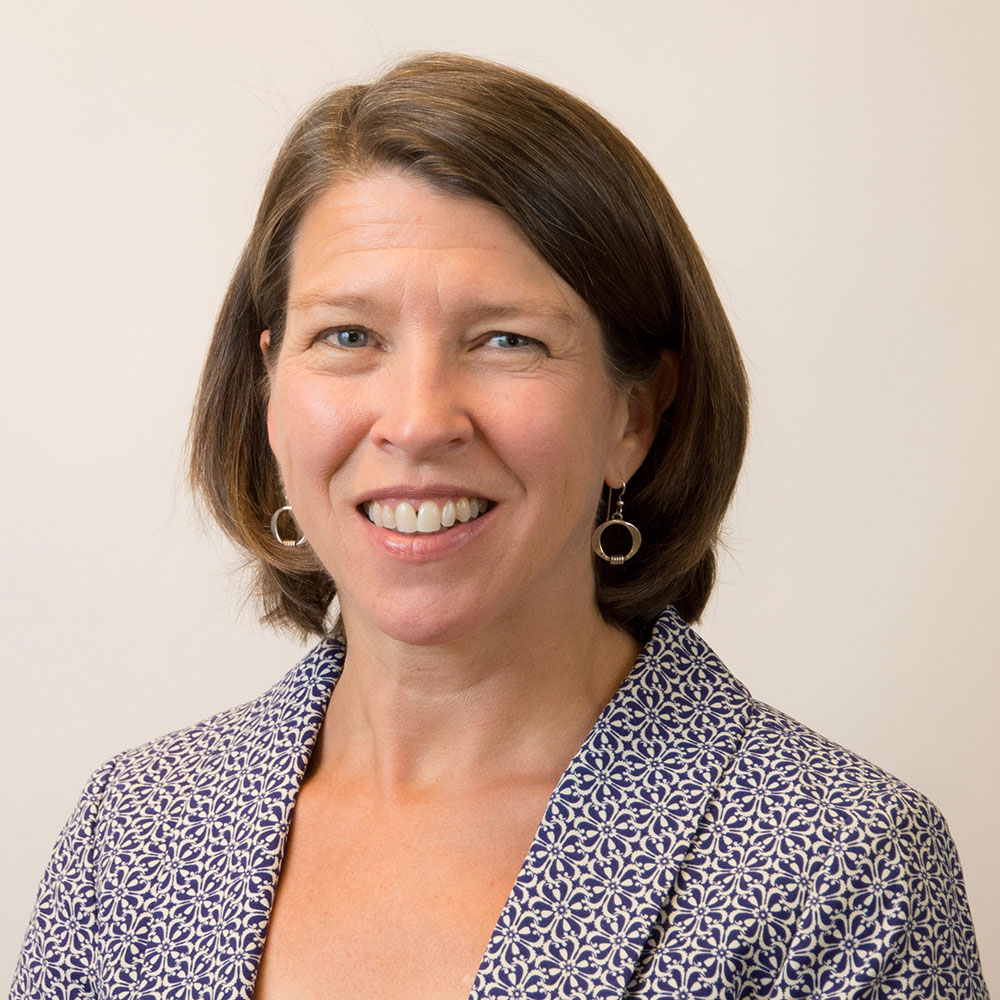Taking the Lead in Tackling COVID-19

The vaccination team for Cape Elizabeth Middle School poses at the celebratory photo booth that was set up for the students to take pictures after receiving their vaccination.
Over two years into the COVID-19 pandemic, MaineHealth knows that simply reacting to the changes and challenges brought on by new CDC guidelines, research, vaccine availability, and SARS-CoV-2 variants wouldn’t be enough to achieve our vision of working together so our communities are the healthiest in America. By instead being proactive through innovation and partnerships, MaineHealth emerged as a respected leader in COVID-19 response.
Health systems in Maine have contributed to some of the highest vaccination rates in the nation. Around 81% of Mainers are fully vaccinated; 58% of those fully vaccinated have received their first booster dose. Memorial Hospital in New Hampshire has administered over 30,000 doses, contributing to the 76% of people in Carroll County who are fully vaccinated. And more Maine people have received their COVID-19 vaccine from MaineHealth than any other entity – nearly 600,000 doses.
Perhaps even more remarkable is the volume of COVID-19 testing processed through MaineHealth’s NorDx laboratory – over 1,250,000 COVID-19 tests to date, having reached the one millionth test mark in January of 2022.
Through numerous collaborations with schools and other organizations, care team member reassignments to staff vaccine clinics, an award-winning messaging campaign, and innovations in research and COVID-19 response, our integrated health system continued to work together to keep our communities safe and well throughout the pandemic, improve patient outcomes, and build toward our future.
“A shot for you isn’t just a shot for you. It’s a shot for all of your family and friends.”
“A shot for you isn’t just a shot for you. It’s a shot for all of your family and friends.”
Communicating with Accuracy and Empathy
As vaccines became more widely available and proven to protect against COVID-19, MaineHealth pivoted in its messaging – from asking people to mask up and stay home—to requesting that people get vaccinated to protect our communities. MaineHealth Patient Vaccine Hesitancy Research data informed the messaging strategy, with COVID vaccine messaging weaved into every touch point across the patient journey. People were encouraged to schedule their vaccine appointment online, which had a positive impact on reducing workforce pressures in practices by decreasing call volume.
As safety guidelines evolved regarding exposures, symptoms, and positive tests, MaineHealth developed easy-to-navigate instructions on “What To Do When,” helping people stay healthy by identifying when to get tested, stay home, or seek care.
By addressing vaccine hesitancy, MaineHealth not only helped inform and educate patients and communities to keep them healthy; it also garnered national attention with MaineHealth chief marketing and communications officer Terri Cannan receiving the Brand CMO of the Year Award from Ad Age. MaineHealth videographer Charlie Berg also won a regional Emmy Award for his video that captured the thoughts and emotions of Maine Medical Center ICU nurses as they cared for unvaccinated patients during the Delta surge.
Vaccinations for Our Schools and Communities
From Islesboro, to Troy, to Gorham, to North Conway, MaineHealth partnered with school systems across Maine and New Hampshire to hold vaccine clinics, a convenient way to get children vaccinated while relieving pressure from pediatric practices. “Supporting a traveling vaccine clinic in the schools provided a convenient option for parents and streamlined the process for administering both doses of the vaccine in a timely manner,” said Andrea Lai, PharmD, Senior Director of Ambulatory Pharmacy for MaineHealth.
From November 2021 to August 2022, there have been approximately 17,800 doses administered at school vaccination clinics, around 16,500 of which were administered to children ages 17 and younger. In addition to the clinics, MaineHealth hosted a number of vaccine information sessions for parents, supplemented with a children’s vaccination website and detailed answers to frequently asked questions. Brian Marden, MaineHealth’s Chief Pharmacy Officer explained, “Our vision of working together so our communities are the healthiest in America was on full display when we were able to closely partner with local school departments to offer convenient and easily accessible pediatric COVID-19 vaccinations. To mobilize and visit schools to deliver critical public health services showcased the very best in innovation and excellence by our care team members involved.”
In Greater Franklin County, Healthy Community Coalition’s Hometowns Partnership supports trusted voices in local communities in sharing information about COVID-19 vaccines, building vaccine confidence and addressing barriers to vaccination for individuals in under-served communities.
RECOVER: Researching Long-Term Effects of COVID-19
In November 2021, MaineHealth received approximately $1.5 million from the National Institutes of Health (NIH) for up to four years to participate in a nationwide study of the long-term effects of COVID-19. Researchers from MaineHealth Institute for Research (MHIR) are among those at more than 70 institutions across the country participating in the NIH Researching COVID to Enhance Recovery (RECOVER) Initiative. MaineHealth opened RECOVER in December 2021 and this observational study is expected to complete its target enrollment of 85-90 patients across the MaineHealth service area by Fall 2022 (nationwide enrollment goal is 17,000). The MaineHealth research team noted high interest in the study from the public and is planning to follow the participants for a maximum of 4 years.
“While it’s clear that many patients continue to suffer COVID symptoms for months after recovery, we still don’t know why. This study hopes to answer that question and find some ways to bring relief to those experiencing long COVID.”
– Ivette Emery, PhD
While the RECOVER study is an observational study, the NIH has plans for several treatment studies including two that will be occurring at MaineHealth later in 2022 and early 2023.
For more information about RECOVER: recovercovid.org

Ivette Emery, PhD, translational scientist at MHIR and co-Investigator for the MaineHealth RECOVER site
Understanding COVID-19 Vaccine Hesitancy in Rural Maine
There has been significant hesitancy to receive a COVID-19 vaccine in some populations, including rural communities, despite the fact that the vaccines have been clinically proven to be safe and effective at preventing severe illness, hospitalization, and death. Kathleen Fairfield, MD, DrPH, and Elizabeth Jacobs MD, MAPP applied for and received a pilot grant award from the Northern New England Clinical & Translational Research Network to study vaccine hesitancy in rural Maine.
This pilot funded interviews and surveys of Maine residents in four rural counties about the COVID-19 vaccination and the findings were used to create and pilot community messaging to encourage Mainers to speak with a trusted physician about vaccination. They found that hesitancy arises from misperceptions about the risk of COVID-19, distrust of government organizations and agencies, and misinformation about the safety of the COVID-19 vaccines and conspiracy theories surrounding them. They also found that what motivated people who were initially hesitant to get the vaccine was the encouragement of their friends and families, a desire to keep a friend or family member safe, and the recommendation of a trusted health care provider. As one patient reported, “I did it to protect myself and to give my family some relief from worry about my contracting COVID.”
According to Dr. Jacobs, VP of Research, “Vaccinating a substantial proportion of Americans with an effective COVID-19 vaccine is critical to bringing the COVID-19 pandemic phase to an end. We are hopeful these results can inform our vaccine efforts in Maine and beyond.”
Recently published survey findings can be accessed here: Vaccines | Free Full-Text | Understanding the Role of Misinformation in COVID-19 Vaccine Hesitancy in a Rural State (mdpi.com)

Kathleen Fairfield, MD, DrPH

Elizabeth Jacobs MD, MAPP
Collapsible Aerosolized Particle Enclosure Innovation Advances
The Collapsible Aerosolized Particle Enclosure (CAPE) is a portable negative pressure isolation tent that fits over patient beds to help contain infectious particles.
An innovative idea to turn hospital beds into negative-pressure spaces for COVID patients is now awaiting regulatory approval from the U.S. Food and Drug administration, thanks to an investment from MaineHealth Innovation’s $100,000 Bonfire Fund.
The Collapsible Aerosolized Particle Enclosure (CAPE) was the idea of two emergency medicine chief residents at Maine Medical Center, Liz Hamilton, MD, and Katie Main, MD, who were looking for a way to isolate COVID patients as they were waiting to be admitted to a negative-pressure room. As experienced campers, they brought their idea of creating a tent-like structure for hospital beds to attending physician Samir Haydar, DO, who encouraged them to develop it. MaineHealth Innovation connected the team with Thermoformed Plastics of New England and Baker Company, who made significant improvements to their early prototype made from plastic and PVC pipe.
The CAPE innovation team used its Bonfire funds to form a company, CAPE LLC, of which MaineHealth is a part-owner. Becoming a company allows CAPE LLC to apply for additional external funding and begin ramping up sales once they get regulatory approval.

